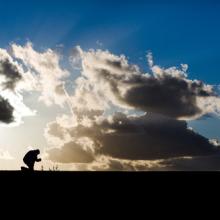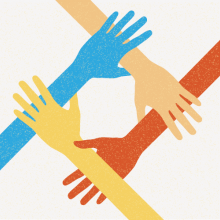trust
FOR MANY OF US, the approaching holiday season brings a mix of excitement and dread. We look forward to gathering with loved ones we haven’t seen for a while. But these gatherings come with land mines of casually dropped remarks that belie our togetherness. They reveal deep chasms between our understandings of what is good for ourselves, this country, and the world.
Do we respond when a family member says something offensive? Do we ignore them? Do we try to engage, even if past attempts have proven fruitless?
My own attempts to engage with family who have different political views and interpretations of scripture have come to an impasse in the past year. I’ve felt wounded and disappointed and am lowering my expectations for these relationships. But the Spirit is also nudging me to keep my heart open a crack.

Image via LEE SNIDER PHOTO IMAGES/Shutterstock.com
The last days of Weiner’s mayoral campaign devolve into farce, with anxious aides running around and the candidate’s interactions with voters getting more and more contentious. While watching the ship go down is entertaining, what makes the story so fascinating is the boldfaced dishonesty at its core. Weiner the man misses what Weiner the film understands about his predicament: that being made a fool by trusting in the wrong person is an awfully hard thing to forgive.

Image via tomertu/Shutterstock.
After hours of deciphering the directions and gathering together the countless tiny parts, inevitably you discover that a piece is missing. Somewhere in the unpacking of the zillion elements, you have dropped a small part under the refrigerator or behind the radiator. And it’s never just a missing piece, it’s usually the missing piece: the key part that transforms the pile of random plastic into the one-of-a-kind, fabulous piece it was meant to be.
PARDEEP KALEKA and former white supremacist Arno Michaelis clasped hands during a radio interview on the first anniversary of a mass shooting that changed both of their lives. Their embrace was the ultimate symbol of brotherhood—two starkly different backgrounds united by a common goal of peace and understanding in an oftentimes cruel and unforgiving world.
Pardeep Kaleka is a member of the Sikh faith community. His father was one of the six worshippers killed on Aug. 5, 2012, at the Sikh temple, or gurdwara, in Oak Creek, Wis. Three more were injured that day before the man opening fire on the temple was wounded by the police. The gunman then prepared for one final pull of the trigger, taking his own life.
The shooter was Wade Michael Page, a white supremacist, acting on his own volition that Sunday morning. He had spent his life practicing violence and hatred toward all kinds of people he felt to be “different” from him. This hatred culminated in a final unthinkable act, killing six people in cold blood at their holy place of worship.
There was angst, confusion, and grief among the Wisconsin Sikh community after this terrible tragedy. But where many may have expected anger from those most deeply affected, the Sikhs responded with something thoroughly refreshing: peace.
AS A FORMER reserve police officer who has taught ethics at two police academies, I followed the news very closely after 18-year-old Michael Brown was shot to death by police officer Darren Wilson in nearby Ferguson, Mo. When I saw the military equipment of the St. Louis County Police—especially the sharpshooter on top of an armored vehicle aiming his rifle at the protesters—I said to my wife, “This may turn out to be very, very bad.”
Sen. Claire McCaskill argued in the midst of the protests that St. Louis County should “demilitarize the police response” in Ferguson, telling reporters, “The police response has been part of the problem.”
The militarization of police has been trending over the past few decades. When the thin blue line resembles an occupying force, it exacerbates racial tensions in neighborhoods and communities, making things worse for everyone, including the police.
Some communities are starting to push back. For instance, the city council of Davis, Calif., recently directed its police department to get rid of a mine-resistant, ambush-protected vehicle (worth $700,000) that it had received free from the U.S. military’s surplus program.
Joshua Casteel served as an interrogator in Iraq. Then an encounter with a Jihadist challenged him to truly live out his faith.
LATELY I’VE been reading my dead friend’s files. That’s how I know that he often typed in Cambria. That’s how I know that he drafted beginning-to-end, reworking early paragraphs before he set down the next—which is why so much of his writing just stops. That’s how I know that as a child he held press conferences in a White House made of cardboard boxes, wearing a clip-on tie, and that the night before he began school at West Point (a school he’d soon leave), he and his father smoked cigars on a hill overlooking the Hudson River, though his father did not like cigars. That’s how I know how much he thought about pain, which to Heidegger is “the rift,” a “separating that gathers,” and to Wittgenstein is “a having, not a knowing,” and to Elaine Scarry is an “objectless experience” that “destroys language.”
This thinking was for classes at the University of Iowa and the University of Chicago, and this thinking was for other people, namely prisoners and fellow soldiers in the War on Terror, which was also the Global War on Terrorism, and was the Iraq War and is still the War in Northwest Pakistan and the War in Afghanistan, a subset of which is “Operation Enduring Freedom,” and is also and continues to be World War III or World War IV, depending on how you count, and was once The War Against Al-Qaeda and is now the Overseas Contingency Operation, which has been tidily renamed CVE (Countering Violent Extremism).
Joshua Casteel was sent to the Long War after first enlisting in the Army Reserves as a high school junior in Cedar Rapids, Iowa. Seven years later he was stationed at Abu Ghraib prison as an interrogator and linguist. This is where he became convicted that he could no longer be an “American war fighter,” which he saw as treason against his “real kingdom and home.”
LAST YEAR on NPR’s “All Things Considered,” I heard the story of Teresa MacBain, a United Methodist pastor who came to the conclusion she was an atheist. The situation was scary and awkward for her. Who could she tell? What would she do now for a living?
She wasn’t trained for any other occupation, but neither could she continue her double life of preaching and public praying while knowing she didn’t believe in any of it.
Lacking someone to confide in, MacBain secretly confessed to her iPhone, “Sometimes I think to myself: If I could just go back a few years and not ask the questions and just be one of the sheep and blindly follow and not know the truth, it would be so much easier. I’d just keep my job. But I can’t do that. I know it’s a lie. I know it’s false.” Eventually, she left the ministry.
As I listened to MacBain’s interview, I empathized with her. After 30 years of serving as a Mennonite pastor, I often wonder whether I still believe the things I’ve always said I believed. My questions about God have become deeper, while my previous answers now sound shallow. The thought that I might not believe in God is frightening. It threatens my identity and worldview—not to mention my occupation. And yet I haven’t arrived at MacBain’s atheism. Instead, my doubts have been folded into my faith.
The truth is that our faith and spirituality is often dependent on hundreds of different relationships, factors, institutions, and circumstances that we directly correlate with God.
When our Christian expectations are shattered, it’s easy to blame God. We mistakenly idolize the things that are associated with God, and assume that if one of these aspects failed then God failed.
“Christianity” will fail us. Our churches will attack, our pastors will lie, our mentors will manipulate, our friends will betray, and when this happens, our beliefs will be shaken to their core.
THE CONGREGATIONAL HEALTH NETWORK began with a simple request from the largest hospital network in Memphis to a group of local pastors: Help us take better care of your people.
Ten years ago, officials at Methodist Le Bonheur Healthcare were worried that chronic diseases such as hypertension, diabetes, and obesity were threatening the well-being of local residents and sending health-care costs through the roof.
“People in their 20s were coming to the emergency room in end-stage renal failure,” said Rev. Bobby Baker, a Baptist pastor and director of faith and community partnerships at Methodist Healthcare. “That person is going to be using critical care resources for the rest of their life.”
Hospital officials knew something had to change. They wanted to focus on preventive health care—getting people in to see their doctor long before they were in a crisis. So in Memphis, a city where faith remains a powerful force and more than 60 percent of the population has ties to a religious group, they turned to churches for help. It started small, with a group of about a dozen pastors at churches near Methodist South hospital, in the city’s Whitehaven neighborhood. Those pastors recruited church members to serve as liaisons to the hospital, while the hospital assigned staff to work with churches. That small pilot, first called the Church Health Network, began in 2004.
Two years later, Methodist CEO and president Gary Shorb, along with Rev. Gary Gunderson, the former senior vice president for Methodist’s faith and health division, decided to expand the project system wide. That was the only way to make a significant impact on health outcomes, said Baker. “The thought was that it can’t be a pilot, it can’t be a research project—it really has to be broad reaching,” he said.
This is a very personal column. In December of last year, I was diagnosed with prostate cancer. There were no symptoms or problems, just some results from a routine blood test that needed to be checked out. I remember being on a conference call when I saw the doctor was phoning with the results of a biopsy, but continued on with the other call assuming I could return it later to hear that there were no problems. There were problems, he told me, and I would need to see a surgeon.
Surprise was not the right word — not even shock. The news felt incredulous to me. I was about to launch a new book tour early in 2013 and everything seemed to be in control. And Sojourners was involved in intense advocacy work around immigration reform, gun violence, and the budget/sequester battles. There had to be a mistake, or surely some convenient treatment that would suffice. Certainly, I would work this all out privately, and stay on schedule for everything else. But then the conversations started, as did meetings, further testing, time-consuming activities, discussions of medical options — and a deepening anxiety began to grow over the next several weeks.
The book tour for On God’s Side, both U.S. and U.K., had to be postponed and reset without saying why. I kept the health news and discussions in a small and close circle of family, friends, and senior staff. And I did my best to go on as if this wasn’t happening. But it was.
Editor’s Note: As we continue reporting on the important topic of sexual abuse and violence, Sojourners has opened up the Sexual Violence and the Church blog series for submissions. This piece is one such submission. If you are interested in submitting a post for the series, please email the Web Editor HERE.
"From the beginning …" began my pastor, rising slowly from his armchair. With his next words, he broke my world apart. From the beginning, he had been attracted to me as a woman. From the beginning, his interest in me had been personal. He told me the reasons why, and then he said these words: "If we were both single, and if I weren't your pastor, we'd be going out to dinner." He paused a long beat. “And we’d see where it went from there."
Were my pastor's words an act of sexual violence?
When we hear the words "sexual violence," we may envision a forcible rape or a sexual act with a person incapable of consent. Many of us would consider unwanted groping or uninvited embraces to be acts of sexual violence. Some of us would include "consensual" sex between persons of different rank, because we understand that power disparity makes meaningful consent impossible. But what about the manipulative behavior that gives rise to the delusion of consent? Was my pastor's not-quite-a-proposition an act of sexual violence? Could a lingering handshake, a compliment on spiritual gifts, or an offer of pastoral support be acts of sexual violence? Most of us would say no. And most of us would be missing the boat.
WITH TROUBLING DIVORCE RATES, the trend among younger couples to postpone marriage or abstain from it altogether, and other factors, some feel we are in danger of losing marriage in this society. The institution is arguably in serious trouble.
This period of intense media focus on marriage—while more and more states legally affirm marriage equality and the Supreme Court ponders two related cases—offers the opportunity to examine the institution of marriage itself. How can we strengthen and support marriage, a critical foundation of a healthy society? How can we, as church and society, encourage the values of monogamy, fidelity, mutuality, loyalty, and commitment between couples?
A study by the Barna Research Group a few years ago found that “born again Christians are more likely than others to experience a divorce,” a fact that pollster George Barna said “raises questions regarding the effectiveness of how churches minister to families.” Our authors in this issue wrestle with what it takes to build long-lasting marriages, rooted in and offering a witness to God’s covenantal love. —The Editors
MY HUSBAND AND I have been married to each other for 42 years. Does this make me an expert on heterosexual marriage? Not really.
My experience over 40 years as a pastor, teacher, and theologian helps some in thinking about marriage, as I have counseled couples and performed countless weddings, in addition to my personal experience. But as a contextual theologian of liberation, I know that to extrapolate from your own experience, or even from that of a small group, means you end up colonizing other people’s experiences through ideological privilege. In short, what that means is you think you know more than you really do. Hence, using social, political, and economic analysis is crucial if we are to think theologically in context about marriage.
A couple of things seem clear, however. Marriage, in all its manifestations, is going through tremendous change in our society, and marriage as a social and political institution, and as a religious practice, needs strengthening.

Gumpanat / Shutterstock
WHEN I FIRST began to write this article, I thought to myself, "How do you promote something as vaporous as silence? It will be like a poem about air!" But finally I began to trust my limited experience, which is all that any of us have anyway.
I do know that my best writings and teachings have not come from thinking but, as Malcolm Gladwell writes in Blink, much more from not thinking. Only then does an idea clarify and deepen for me. Yes, I need to think and study beforehand, and afterward try to formulate my thoughts. But my best teachings by far have come in and through moments of interior silence—and in the "non-thinking" of actively giving a sermon or presentation.
Aldous Huxley described it perfectly for me in a lecture he gave in 1955 titled "Who Are We?" There he said, "I think we have to prepare the mind in one way or another to accept the great uprush or downrush, whichever you like to call it, of the greater non-self." That precise language might be off-putting to some, but it is a quite accurate way to describe the very common experience of inspiration and guidance.
All grace comes precisely from nowhere—from silence and emptiness, if you prefer—which is what makes it grace. It is both not-you and much greater than you at the same time, which is probably why believers chose both inner fountains (John 7:38) and descending doves (Matthew 3:16) as metaphors for this universal and grounding experience of spiritual encounter. Sometimes it is an uprush and sometimes it is a downrush, but it is always from a silence that is larger than you, surrounds you, and finally names the deeper truth of the full moment that is you. I call it contemplation, as did much of the older tradition.
It is always an act of faith to trust silence, because it is the strangest combination of you and not-you of all. It is deep, quiet conviction, which you are not able to prove to anyone else—and you have no need to prove it, because the knowing is so simple and clear. Silence is both humble in itself and humbling to the recipient. Silence is often a momentary revelation of your deepest self, your true self, and yet a self that you do not yet know. Spiritual knowing is from a God beyond you and a God that you do not yet fully know. The question is always the same: "How do you let them both operate as one—and trust them as yourself?" Such brazenness is precisely the meaning of faith, and why faith is still somewhat rare, compared to religion.
In the past 20 years, the world has witnessed the death of social contracts. We have seen a massive breakdown in trust between citizens, their economies, and their governments. In our own country, we can point to years of data painting a bleak picture of the confidence Americans have in any of our traditional institutions.
Former assumptions and shared notions about fairness, agreements, reciprocity, mutual benefits, social values, and expected futures have all but disappeared. The collapse of financial systems and the resulting economic crisis not only have caused instability, insecurity, and human pain; they have also generated a growing disbelief and fundamental distrust in the way things operate and how decisions are made.
This week at the World Economic Forum in Davos, Switzerland, we are looking to the future and asking “what now?” At a Saturday session — “The Moral Economy: From Social Contract to Social Covenant” — a document will kick off a year-long global conversation about a new “social covenant” between citizens, governments, and businesses.
This is really “a call” for worldwide discussion about what values are needed to address the many difficult challenges and choices the world is now facing. Inequality, austerity, retrenchment, constraints, mal-distribution, growing conflicts over resources, and extreme poverty all raise questions about our values.
This past Saturday, on a brilliant fall morning, my eight-year-old son came bounding downstairs for breakfast. I reached into the refrigerator, grabbed a cold Diet Mountain Dew from in between glass-bottled organic milk and tomato juice, and served it to him with farm-fresh eggs, feeling the part of a drug dealer.
We had a long day ahead, and I wanted to see what happened.
I smiled to myself, imagining some upcoming event, the mothers’ conversation all about peanut-free this and local that, when I’d pipe above the crowd to say, Hey sweetheart, how about your Mountain Dew?
The arrival of Diet Mountain Dew in my house is only the first in a cascade of little experiments we are now undertaking as a result of neuropsychological testing in August indicating that my son has a form of attention deficit hyperactivity disorder. Our house has never lacked order or discipline, and yet now we are thinking about how to structure everything more explicitly.
Diet Mountain Dew, with its massive amounts of caffeine, is our initial effort in our goal of avoiding, for now, giving him any stimulant medications: Did you know that caffeine actually calms down a hyperactive person, allowing them to focus? Maybe that’s why I’ve drunk eight cups of coffee every day since around 1985.
I tried the coffee with my son first, hoping I could cultivate a new bond with him over a shared habit. He detested the stuff. You could always give him Red Bull, one of my brothers said. I couldn’t bring myself to do that, hence the Diet Mountain Dew.
I am a bubbly extrovert who struggles with an enormous amount of anxiety when meeting new people.
Sounds like an oxymoron doesn’t it?
This weekend, I ventured down to Chicago to meet a group of women I’ve been in relationship with via Internet for more than a year. Let’s just break that down for a minute:
- a group of women
- a group of women I’m meeting for the first time… alone
- a group of women who have a preconceived notion of who I am based on good pictures and thought-out witty comments I post online.
The "sermon" consisted of reflections by five participants from different regions and traditions who were attending the Global Christian Forum for the first time. They each spoke of the joy, and often the surprise, in what they discovered here -- some of them interacting with delegates from Christian traditions they barely knew even existed.
The unity of heart and Spirit they experienced at the forum had a profound effect, they said. Emily Obwaka of Kenya, a staff member from the Association of Evangelicals in Africa, whom I met on the bus the first day of the forum, was one of those who shared. She said the forum felt like "a preamble to heaven." Such sentiments might seem excessive but they were not uncommon among the 287 forum participants from 65 countries. Joy and affirmation were among the greatest takeaways from the five-day gathering.








